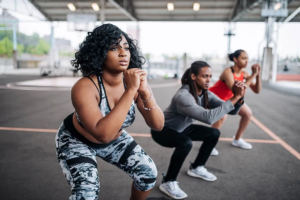In recent times, there has been a concerning rise in reports of people collapsing while exercising, with some cases leading to death. This has raised serious questions about what causes these sudden collapses and how they can be prevented. To gain insight into the issue, Africa Health Report, AHR, reporter, Sultan Rabiu spoke with Danladi Stephanus, a gym instructor, based in Abuja, who provided detailed explanations on the possible causes of such incidents and how they can be avoided. Enjoy your weekend as your heed to his advice.
Why Do People Collapse During Workouts?
Danladi: Several factors can contribute to someone collapsing while exercising, but one of the most important is medical history. “Alright, sometimes the reason for this is, first, when a client comes to work out, you have to ask them specific questions like: Have you had any health challenges before? If you have undergone surgery and have not fully recovered, are you supposed to be working out? Without asking these questions, someone might collapse during a workout.”

Underlying medical conditions also play a major role. “Maybe the person has a health issue, and the doctor has advised them not to exert themselves too much. Yes, some people tend to push beyond their limits during workouts. They might not even be aware of their limits, and they overdo it. Suddenly, they just collapse”.
Could enlighten the readers on the risks of overexertion and ignoring Warning Signs?
Danladi: Gym instructors take precautions by monitoring clients during workouts. However, some individuals may push themselves too hard. “That is why we are here most of the time. It is part of the questions we ask our clients before the workout. If we ask and they lie to us… Some people may lie just to gain access to the gym and push themselves too hard. So, we observe them. Through observation, we can notice certain reactions that indicate what the person is experiencing. Even if they don’t tell us, their reactions reveal the truth. In such cases, we restrict them from certain workouts and ask them to rest.”
When people overexert themselves, it takes a toll on their bodies, especially if they are new to working out. “Because some people, when they overdo it… it will have an impact on their body, especially if they are new to working out. Yes, this can cause these issues.”

What is the impact of dehydration and poor nutrition?
Another factor that contributes to workout collapses is dehydration. “Dehydration matters a lot. When you’re working out, you’re sweating. Some people don’t drink water while working out. It is advisable to drink water once you feel thirsty. This helps to replace the water lost through sweat. It also helps to restore energy and cool your system. During workouts, your body heats up, and staying hydrated is essential,” explained.

Poor nutrition also plays a role in energy depletion during exercise. “Yes, definitely. If you are not eating well, it affects your performance. Everyone comes to the gym with a goal. Some want to lose weight. Some want to gain weight. Some want to build muscle. If you’re losing weight, you have to be mindful of your diet. You need to manage what you eat and when you eat. If you’re not getting enough nutrients, your body won’t have the energy for exercise.”
Can Exercises Lead to Collapse, Death?
Yes. Some exercises are more physically demanding and can lead to collapse if not done properly, especially for those recovering from surgery. “Yes, some exercises can be risky, especially if you are recovering from surgery. You are not allowed to lift heavy weights. Intense cardio workouts are also not advisable in such cases. But even without surgery, overexertion can cause a collapse.”
I can highlight that endurance levels vary among individuals. “Someone might spend five hours in the gym, while another person may not be able to last an hour. Our bodies are different. What your body can handle, mine may not. Endurance varies from person to person. If you don’t listen to your body, anything can happen. If you’re working out and feel exhausted, you should stop and rest. If you try to push yourself beyond your limit, you may collapse or injure yourself.”
What is the best time to Work Out?
While people have different workout schedules, morning workouts are more effective. “Yes, morning workouts are generally the best. The temperature is cooler, and it’s good to start your day with exercise. The ideal time is between 5 AM to 7 AM or 6 AM to 8 AM. But it depends on your schedule.”
However, evening workouts can also be beneficial. “Some people work out for two to three hours every morning. Others prefer road walks as early as 4 AM. It depends on your fitness level and goals. In the evening, some people find it easier because they have finished work and can relax before exercising. Evening workouts are good because the temperature has dropped. However, late-night workouts, around 10 or 11 PM, are not advisable because of body temperature regulation.”
How can the incidences of deaths during exercise be reduced? Or reduce the rate of Workout Collapses?
Danladi: The importance of medical check-ups before beginning any fitness routine cannot be underplayed. “As a gym instructor, my advice is: First, go for a medical check-up before starting any exercise routine. Check your heart, liver, and kidneys to ensure you’re fit for exercise.”
Proper hydration is also critical. “Another issue is that some people go to the gym without carrying water. You must stay hydrated because dehydration is dangerous. Water is life. It helps replace what you lose through sweating.”
Gym facilities should also take responsibility for ensuring safety. “Most gym centres have equipment to check basic health indicators. They also have first aid kits for emergencies before getting to the hospital.”
Above all, listening to one’s body is the best way to prevent collapse. “Listening to your body is also very important. As a gym member or athlete, do not overdo it. Know your limits and stop when necessary.”
The rise in workout-related collapses is a serious issue that requires attention. As more people engage in fitness routines, understanding the risks associated with exercise is essential. Whether it’s due to underlying health conditions, overexertion, dehydration, poor nutrition, or improper exercise techniques, people must take precautionary steps to protect their health.
Exercise should improve your health, not put your life at risk, by prioritizing medical checks, hydration, proper nutrition, and body awareness, we can reduce these tragic incidents and make fitness a safer journey for everyone.



